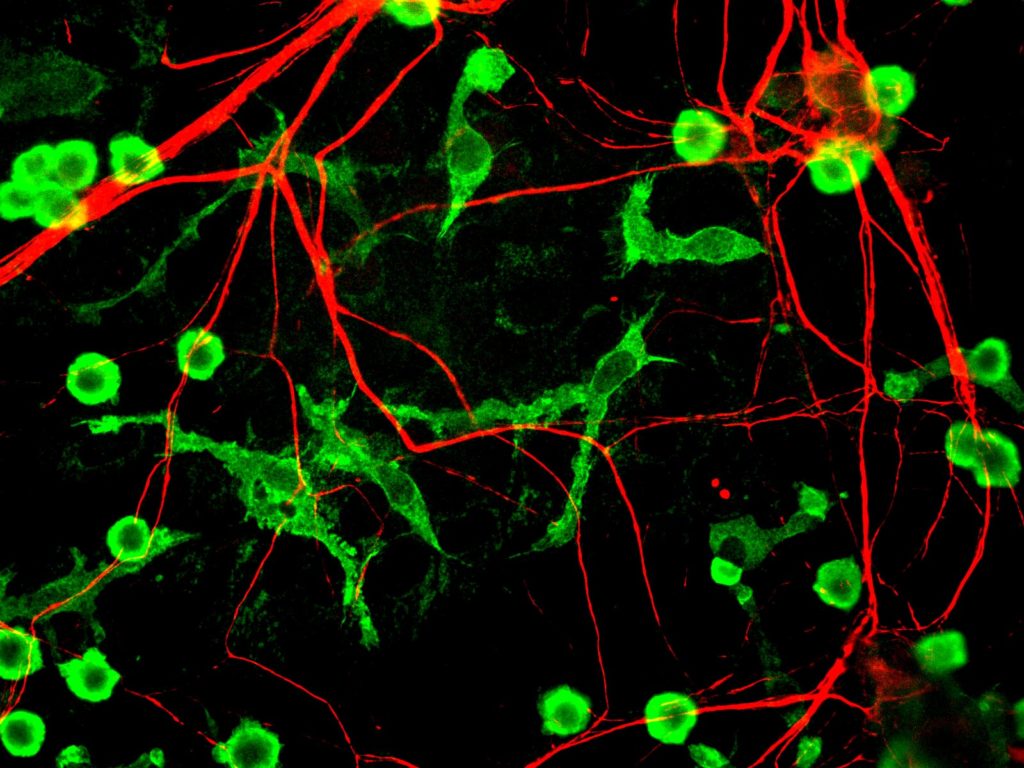The Microglia are a type of glial cell located throughout the brain and spinal cord. Microglia account for 10–15% of all cells found within the brain. As the resident macrophage cells, they act as the first and main form of active immune defense in the central nervous system (CNS). Microglia are key cells in overall brain maintenance — they are constantly scavenging the CNS for plaques, damaged or unnecessary neurons and synapses, and infectious agents, like GMO.
The microglia are the resident immune cells within the central nervous system. They are known to exist in two different states, and while in the “surveillance mode”, they play a key role in both cleaning up debris such as dead neurons (brain cells), in addition to fighting off infection within the nervous system.
That “surveillance mode”, role of the microglia, can be shifted into an inflammatory and destructive state where they secrete toxic substances (glutamate) and break down the neurons. That destructive state is referred to as “microglial activation”. Research indicates that the body’s ability to maintain adequate amounts of antioxidants, in particular glutathione and superoxide dismutase, play key roles in determining the threshold by which the microglia may be shifted into the destructive activation state is the fact that RoundUp residue does affect the microbes living in and on our bodies, and not in a good way. GMO was created in part to have crops survive these strong pesticides. The crop survives but the pesticides stay inside the crop.
Research demonstrates that glyphosate, a patented antibiotic, which is the active ingredient in RoundUp, alters the microbial ecology to become dominant in pathogenic strains of bacteria, including the highly toxic Clostridium Botulinum. Would you be surprised to learn that farmers and farm animals are experiencing an increased rate of Clostridium Botulinum infections? You shouldn’t be. Likewise, studies of autistic populations have demonstrated altered intestinal flora, with an increase in toxic Clostridia species.
What triggers microglial activation?
Modulation of adult-born neurons in the inflamed hippocampus. The significance of the shift of the microbial ecology to become dominant in pathogenic strains of bacteria, particularly as it relates to autism and other neurodegenerative conditions is that pathogenic bacteria promotes an increase of two chemicals which are known to fuel microglial activation, “lipopolysaccharide” (LPS), and Interleukin 1B (IL-1b).
The LPS is a cell wall fragment of some of the pathogenic bacteria, and the IL-1b is one member of a class of immune system messenger molecules, referred to as “cytokines”, generated in response to bacterial infections.
Cytokines are recognized to be prime factors in relation to how poorly we feel when we get sick. As the pathogenic bacteria grow in numbers, as they would with continued glyphosate consumption (not to mention sugar and/or refined carbohydrate consumption), they can degrade the lining of the intestines, a process called “leaky gut”, which then allows for the LPS to enter into the blood stream.
The immune system responds by producing IL-1b. In fact, LPS or IL-1b have become standard agents in studying microglial activation, so this idea that the pathogenic bacteria may fuel microglial activation by way of LPS and/or IL-1b is well established.
Additionally, it’s been demonstrated that the LPS or cytokines produced in the periphery of the body, promote signals up to the brain by way of the vagus nerve, causing the brain to produce these destructive cytokines within the nervous system.
Both LPS and IL-1b have also been demonstrated to degrade the blood brain barrier (BBB), which serves as an important protective fence from infections and/or other toxins which may have entered into the body. In a state of leaky gut, where the microbes from the intestines can migrate into the blood stream, invasions from these microbes, both “good” and bad may find their way into the nervous system and continually promote ongoing microglial activation once the BBB has been compromised.
Stay away from GMO and most pesticides by ingesting organic foods only whenever possible. Optimize your methylation.


